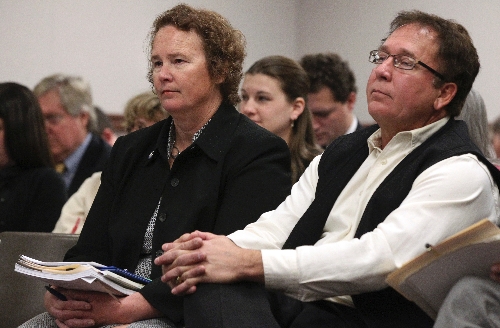Comstock residents want to change eminent domain law
CARSON CITY -- Residents of Nevada's historic Comstock district on Monday urged lawmakers to strip mining companies of their right to eminent domain in order to prevent rural communities from being buried by the industry.
Most testified in support of a bill by state Sen. Sheila Leslie, D-Reno, who said the 130-year-old legal provision allows mining companies to trample individual property rights.
Residents from Gold Hill and Silver City along with community and environmental activists said mining companies' eminent domain privileges threaten homes, businesses and towns that come between major mining companies and valuable underground minerals.
Senate Bill 86, which also would take the privilege away from Nevada's defunct sugar beet industry, is opposed by the Nevada Mining Association.
Monday's hearing was informational and the committee did not vote.
"The mining industry holds the privilege of taking my property through the power of eminent domain," said Silver City resident Larry Wahrenbrock. "It violates the core principles of a citizen's right to hold private property."
Although mining industry representatives testified the provision is rarely used, Comstock residents said they live under the threat of eminent domain by a mining company with a plan for land near the Gold Hill that "will involve relocation of certain landowners," Wahrenbrock testified.
The potential relocation is mentioned deep inside a 111-page report by Comstock Mining Inc., on a project in the tiny town in Storey County, which is home to the historic Gold Hill Hotel.
A representative of Comstock Mining did not respond to a call for comment.
Gold Hill enthusiasts are not the only ones who fear the law.
Silver City resident Allison Woodman said potential mining is a threat to her home, which dates back to 1870. "I'd hate to see any of that area bulldozed and left to be a big open pit," she said.
Tim Crowley, president of the Nevada Mining Industry, noted other private entities, such as utilities and railroads have eminent domain rights in Nevada.
Crowley added the mining industry directly employs 12,000 people in rural Nevada and needs to maintain the tools it uses to continue to explore for important minerals, such as rare earth metals and lithium, which are important for electronics and alternative energy development.
"The eminent domain law has long recognized mining is a public interest use of the lands and is of paramount interest in Nevada," Crowley said.
After the hearing, James Wadhams, a lobbyist for the mining association, said Leslie was more interested in attacking mining than resolving legitimate concerns with the use of eminent domain.
"Mining is the only private industry that is picked out," Wadhams said.
Sen. Michael Roberson, R-Las Vegas, asked several questions during the hearing. Afterward he said, "I don't believe mining should be able to have the power of eminent domain over other private property owners."
Debate about the law has cropped up over the decades and was renewed this summer by a court case in Elko County.
Fronteer Development Inc. sought to use eminent domain to condemn almost 1,800 acres of the Big Springs Ranch, on some of which the Vancouver, British Columbia-based mining company has mineral rights.
The case pitted the pro-mining provisions of the state's eminent domain statutes against legal restrictions added in 2008 by the People's Initiative To Stop The Taking Of Our Land (PISTOL) . The landowner settled with the mining company and sold the land before the mining law could be tested against the initiative.
In earlier decades, mining companies exercised eminent domain to acquire property that was not being mined by its owners.
As recently as the 1980s, mining companies pushing eminent domain generated resistance, and headlines.
Tuscarora residents waged a campaign in 1989 and blocked a plan by Horizon Gold Shares of Denver to raze about half of the community for a pit mine.
Storey County residents complained when Houston Oil and Minerals Corp. sought to use the law to acquire private property in Gold Hill. In 1981 the Legislature amended the law to require notification in the event a mining company sought to use eminent domain to take land in an area of historical significance.
But the plan died not because of public pressure but because the price of gold and silver dropped and sapped its profit potential.
Contact reporter Benjamin Spillman at bspillman@reviewjournal.com or 702-477-3861.

















